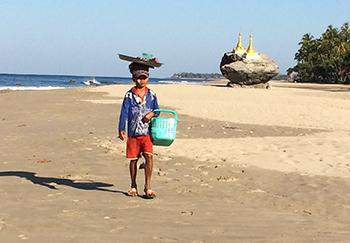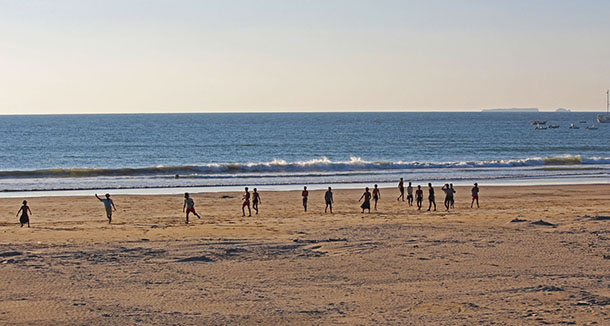NGWE SAUNG, Irrawaddy Division — This stretch of beach was once an untouched coastal area providing livelihoods for local residents with plentiful coconuts, fish and fertile farmland.
But beginning in the early 1990s, the entire populations of seven villages—Bukwelay, Kyauk Kyi, Kyauk Hse, Zee Hmaw, Chaukchaung, Magyi Hmaw and Phone Mg Kyai—were forced to relocate, with little or no compensation.
“This area was full of coconut trees and we were [living] in the jungle till 15 years ago,” said Khin Than, once a resident of Kyaukkyi, in Ngwe Saung.
Here in western Irrawaddy Division, not far from the border of Arakan State, the original residents speak mostly Arakanese and the cuisine of the state just to the north is eaten. The sleepy area now known collectively as Ngwe Saung was unknown to the outside world until companies run by cronies of the Burmese military regime—such as Yuzana, Htoo Trading, Kanbawza and Asia World—began developing hotels, rubber plantations and shrimp farms.

Development has forced the locals into smelly, crowded communities, which were created in the swampy hinterland.
“We were not used to staying in such muddy ground at first,” said San Htay, a former resident of Zee Hmaw village, where the “Sunny Paradise” hotel now stands.
“They [authorities] came to our houses, built around the coconut trees. They took down all our homes early in the rainy season in 2000 and relocated us to the place where we live now,” said the 37-year-old, with a tear in her eye.
“We cannot do anything, we cannot say anything,” she said of the futility of standing up to the authorities in the past.
Ngwe Saung has since then been upgraded to the status of a township in its own right, and can be reached easily from Rangoon, via the division capital of Pathein and a new road. Local and foreign tourists alike are flocking to the beach in increasing numbers.
The beach was the site of sailing events for Burma’s Southeast Asian Games this month. And visitor numbers, as for the whole of Burma’s tourism industry, are expected to keep growing.
The locals claim that they did not get any compensation for their land except small payments for each coconut tree that was in a location where a hotel would be built.
“At that time, we were told to count our coconut trees and bring the number to the village authorities,” said Khin Than, a former resident.
Villagers thought they were being asked to take stock of their trees for tax purposes.
“When we arrived there, the authorities said the government would take the land, so they will give us compensation for our trees,” said San Htay, another local whose family used to have 4 acres of coconut trees.
“We lost a lot. We dared not to say anything,” she added. “The payment at that time was 2,500 kyat [about US$2.50] per coconut tree.”
As well as the loss of their coconut trees and easy access to the plentiful fisheries on the coast, farmland was converted into shrimp farm.
“Our 6 acres of farmland was seized by Yuzana’s Unit (D) shrimp farm,” said San Htay, referring to part of the Yuzana conglomerate, which is run by Union Solidarity and Development Party lawmaker Htay Myint.
Hla Win, manager of the Yuzana shrimp farm, insisted the company had followed all regulations, and had repeatedly answered questions from the authorities about the relocation of farmers.
“I have no authority to talk about this in detail,” he said, adding that higher-ups in the company were responsible for talking about the issue. Staff at Yuzana’s headquarters said they could not comment.
Despite years of locals complaints, little action has been taken to address their concerns.
The confiscation of land and farmland continued until 2005 in Ngwe Saung, with land used by local authorities and for road construction, or converted into rubber plantations and shrimp farms. About 1,000 farmers in all lost their homes, cashew plantations or farmland.
“My 25 acres of cashew trees were set on fire by the Shwe War Myay company in 2005 to make way for a rubber plantation,” said San Shwe.
Only after a year of complaining to the divisional military commander San Shwe and others received compensation for their plantations. His 4 acres of coconut farms and 8 acres of farmland in Phone Mg Kyai village—a former settlement on a small island—were also seized for shrimp farming.
“The authorities seized several hundreds of acres of land by simply looking at the map, and all of our farmland and gardens were amongst the land they wanted,” said San Shwe.
Villagers claim that then divisional military commander General Khin Maung Than, confiscated their land for his own rubber plantation in Taunggatone—land which is now the site of the “Bay of Bengal” hotel.
“No one received compensation,” said San Shwe.
On the mountain road to Ngwe Saung from Pathein, a large part of the seized land is left unused.
In July, the locals sent a letter to President Thein Sein and the Irrawaddy Division chief minister asking that farmland not now being used by the companies is returned to its original occupants.
In Ngwe Saung, some of the villagers returned to their land to plow, but were prosecuted earlier this year for trespassing.
Residents say they have heard assurances they will get some kind of compensation, but no official announcements have been made by the companies or the authorities.

















